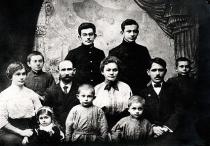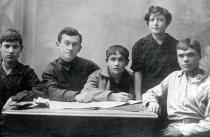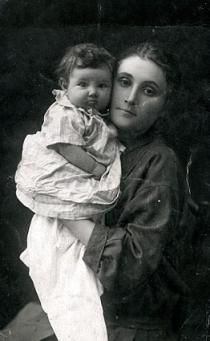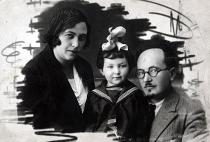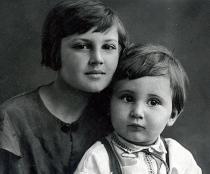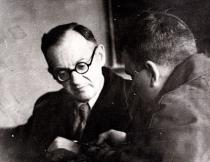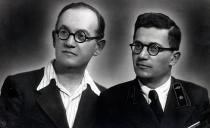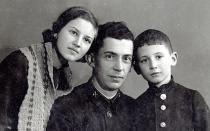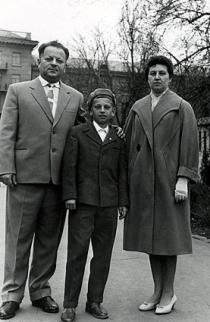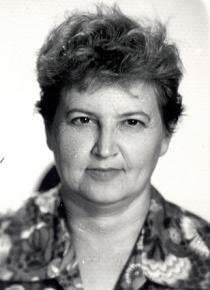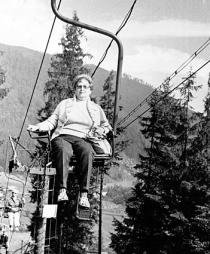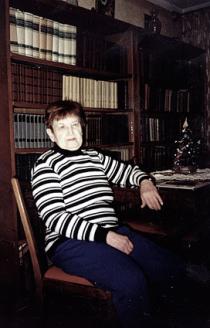This is me, my husband Yefim Kogan, and my son Alexandr Kogan. This photo was taken in Odessa in 1964.
In 1950 I married Yefim Kogan. We registered our marriage in a registry office. My husband Yefim was born to a Jewish family in Odessa in 1920. His father Yefim Kogan died two months before he was born and his mother named him after his father. His mother Rosalia Kogan was director of a kindergarten. She spent all her time at work and her only son was all by himself. Yefim's family wasn't religious. They didn't celebrate holidays and neither he nor his mother went to the synagogue. Yefim was fond of playing chess and attended a chess club in the house of pioneers and later he became a professional chess player. Yefim studied at the Faculty of History in Odessa University. He had finished four years [out of five] at the University before the Great Patriotic war began. According to Stalin's direction senior students had to finish their studies in evacuation. Odessa University evacuated to Maikop (Russia). Yefim graduated from the University in Maikop and then he was sent to an artillery school and after finishing it he went to the front. Yefim was commanding officer of an artillery battery and after the war he returned home. My husband worked in the house of officers. He trained a men's regional chess team of Odessa and a women's national chess team of Ukraine. He was an Honored Coach of the USSR [title of honor].
On 25 July 1952 our son Alexandr was born. In 1959 our sonn Alexandr went to school. He didn't face any anti-Semitism there, but he didn't identify himself as a Jew either. Alexandr studied well. He was a smart and bright boy and he played chess like his father. Alexandr was very attached to his father. He always had a good time with him: Yefim knew literature, art, music and history. Alexandr was fond of light music, he had a very good ear for music. He studied in a music school and often played the piano at home.
In December 1961 he received a two-bedroom apartment with all comforts on the second floor of a 5-storied house on the fifth station of the Bolshoy Fontan [resort area in Odessa]. In the 1960s I worked as a district therapist in a polyclinic. Our chief doctor Dmitri Arkadievich Tsarkovski was a Jew and 90% of doctors were Jews. I was responsible for provision of medical services to the district in Torgovaya Street near the Water Engineering College near the polyclinic. When I fell ill with myocarditis I stopped visiting patients on calls and worked as therapist at reception.
In the 1960s we lived an interesting life. We celebrated all Soviet holidays: 1 May, 7 November, [October Revolution Day], New Year, Victory Day [9 May], birthdays of members of the family and relatives. We made arrangements for each celebration making a list of guests and menus. My husband had Jewish and Russian friends: masters of sports, Honored Coaches of Ukraine. We went to theaters and concerts together. Yefim often brought records of classical operas and new books from his trips. When I met him at the railway station he had two bags when he got off a train: one with records and another one with books. We worked and Yefim also delivered lectures for which he was paid, so we were rather well off. We bought our first TV in the 1960s. My husband brought it from Moscow. We rented a dacha at the Bolshoy Fontan in summer and spent time there with our parents. When my husband went on chess tournaments I usually took a leave and joined him after the tournament was over. I visited Leningrad, Tbilisi and the Baltic Republics traveling with him. I've seen a lot.
In 1969 my son Alexandr entered the Faculty of Labor Economics at the College of Public Economy. He had excellent knowledge of required subjects and he was admitted without any problems. His Jewish identity had no impact on his admission. Alexandr's best friend Yuri Bashkykov also entered this college. They continued to be friends when studying in college and later, when they got married and had families. Regretfully, Yuri suddenly died at the age of 41. In 1974 Alexandr finished his college and got became an economist. He worked as logistics manager in a construction company for some time, and then he became an economist in Odessa department of the Academy of Sciences of the USSR.

